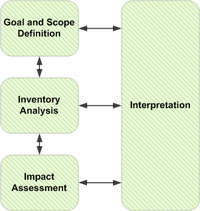
Photo from wikipedia
This article unpacks the logic of the equivalence invoked by the Government of Canada between Indigenous consent and the inclusion of Indigenous peoples and knowledges in impact assessment. We situate… Click to show full abstract
This article unpacks the logic of the equivalence invoked by the Government of Canada between Indigenous consent and the inclusion of Indigenous peoples and knowledges in impact assessment. We situate the logic within the politics of recognition in Canada-a politics that aims to shore up national unity in the face of regular challenges to it. We use the Canadian results from a recent scoping review on conceptions of environmental justice in impact assessment to highlight the challenges of invoking recognition, and we provide a theoretical analysis of these challenges. To do this, we highlight the ways in which 'we-making' is 'knowledge-making' and 'knowledge-making' is 'we-making'. In this sense, recognizing Indigenous knowledges is part of Canada's answer to the challenge of constructing and stabilizing a political 'we': a community of political subjects with shared connection to a nation state via the institutional, social, and cultural apparatuses that generate the kind of publicly visible legal and technical knowledge upon which the state's authority depends. We show how this project relies on actively obscuring the relationship between 'we-making' and 'knowledge-making' by treating 'knowledge-making' as neutral and un-situated, putting into practice a universalist logic. This logic shores up power because obscuring the situatedness of dominant knowledges also obscures the situatedness of the dominant political orders with which they are intertwined. We ultimately argue that Canada's approach to recognizing Indigenous knowledges helps consolidate power by sidestepping ongoing jurisdictional struggles with Indigenous peoples.
Journal Title: Social studies of science
Year Published: 2023
Link to full text (if available)
Share on Social Media: Sign Up to like & get
recommendations!